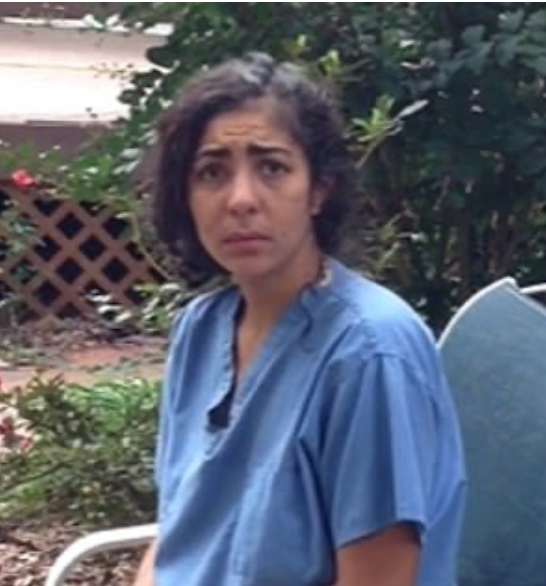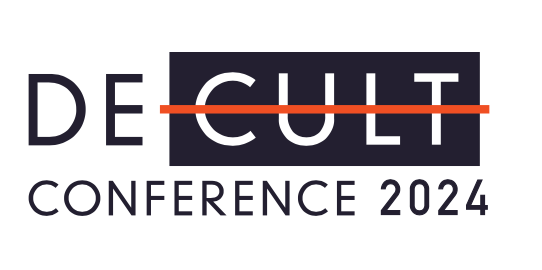Are cults bad for your health?
- Caroline Ansley

- Aug 29, 2024
- 12 min read

In a nutshell, yes.
But you knew this already.
Much in the same way that you know that vapes are bad for your health. There is little data to prove it, but we all know it. When it comes to the impacts of cults on health the evidence base is much like this, or probably even worse. There is increasing research coming out about the impacts on psychological health, but when it comes to the rest of the person and how cults impact their whole body health, across their life span, there is scanty evidence - certainly there is no incidence or prevalence data, nothing to quantify how bad, or specifically in what ways. We just know it to be true because it must be true. Those of us who are looking, paying attention, and those of us who lived in one and got out. We know.
But no one else is paying attention. It is hard to pay attention to something which is actively being hidden from our eyes. Cult leavers - and those who are still in one - are invisible. Invisible to society, who see them (if they see them at all) as caricatured stereotypes; the dim or naive recruit, falling for the obvious or the ridiculous, and then without the will-power to leave once it becomes clear to everyone else what they have fallen into. It is easy - ok, even - to laugh at such people, and hence, if they get out, afterwards they retreat into the background, desperate to escape the mockery of society, nursing the crushing humilation, eager to distance themselves from their history. These people do not volunteer that they were once in a cult. Those who were raised in a cult (and hence were never recruited, and never had any choice about any of it) are simply not seen at all.
Or perhaps cult leavers keep quiet because they are invisible to themselves. It is sadly common for a person to realise decades after their time in a harmful group that what they experienced was not just a disappointing failure on their own behalf - or something they were forced to live through as a result of their parents' choices - but instead, an active campaign to control and exploit them. They realise that they actually were in a cult. The lie that they were fed was a recruiting tractic, then an indoctrination strategy, and together it was a manipulation used by marketeers with the intention of trapping them. By the time the person either escaped, or drifted away with their tail between their legs, they often continue to believe many of the harmful concepts they learnt in the cult, about themselves, about the world outside the group, and about their own place within it. It is only after a perceptive question from a kind person, an accidental click on a device, or a deliberate two hours spent watching a show on Netflix, that they realise.
I met a woman called Felicia in Barcelona about 6 weeks ago. She and I were in a workshop at the International Cultic Studies Association (ICSA) 2024 Annual Conference. She made a comment in the workshop, mentioned her medical training and I zeroed in on her at the end, keen to talk to one of the few doctors at the conference. She introduced herself to me, and something about the name rang a bell. I was in the Sarah Lawrence cult, she said. Oh yes, I have heard about that group, I said. Larry Ray, he went to jail recently? Yes, she said, 60 years, no parole. Wow, I congratulated her. Later, she and I were in a group having a meal in a small restaurant near La Ramblas and we spoke further. We talked about my passion to bring more attention to the healthcare neglects of people in cults, a concern as a clinician that she also shares.
Meeting Felicia nagged at me after I returned to New Zealand. Thinking how being sucked into a cult could derail the career of a promising young doctor sat very uncomfortably with me. I watched "Stolen Youth: Inside the Cult at Sarah Lawrence", soon after I came home, thinking of Felicia, and wanting to understand. "Stolen Youth" is a grim 2023 documentary detailing a cult which developed on an American university campus over the 2010s. You can read more about the documentary in the Guardian article linked here. The following clip is a preview, and gives you some idea of the story:
A small group of university students are psychologically captured by Lawrence (Larry) Ray, the father of one of their friends and a powerfully charismatic man. He moves into their campus dorm, feeds them his stories of an influential career travelling the world and mixing with the powerful, smothers them in love and slowly he distorts their thinking with his conspiracy theories and paranoias until he owns them. Over ten years this group of young people are controlled and exploited by Larry - he records so many of his interactions with them that viewers get to see exactly how he dominates them, skillfully using intimate knowledge that he has gained in moments of vulnerability, or in forced confessions during browbeating sessions, to distort their memories and dismantle their identities. In the third episode of the series I uncomfortably watched on television this woman who I had only just met fragment under his manipulations and abuse.

Felicia is a Harvard University and Columbia Medical School trained doctor, who was on on the verge of sitting her final exams to become a fully fledged psychiatrist when she met Larry Ray and was sucked into his web. She explains how he did it, how he stole her selfhood away from her, how he disintegrated the platform of that selfhood - her connection to reality - until all internal solidity was gone, and only Larry was left. He pulled apart her person-hood, bonding her to himself as her protector/destroyer, leaving only Larry as the source of all truth.
Once Felicia escapes, and has time to reflect, she is interviewed again. She says after it all, I don't know what is real. I keep seeing that expression on her face as she makes that puzzled statement, I don't know what is real anymore.
Along with meeting Felicia in Barcelona at the ICSA conference, I also met a handful of other health professionals. These few health professionals were dotted occasionally amongst the sea of academics, activists, and therapists, and included some of the leading experts in the cult recovery field. Some of these people I interviewed, capturing these small conversations in a vlog diary of the conference which you can check out if you'd like a sneak peak into the conference content (give the page time to load, it's data heavy). If you have interest in what sort of content, I - with my friend Liz, who was also at the conference with me - soaked up at the conference, please check out the page.

While at the conference Liz Gregory, my co-host on the Cult Chat podcast and manager of the Gloriavale Leavers Support Trust, along with Anke Richter, author of "Cult Trip" and director of the Decult Conference (coming up in Christchurch in October this year - get your tickets now if you haven't already) and I gave a panel discussion about the last ten years or so of cult activity and activism in New Zealand. We danced all over the place talking about the people, the places, the events which have brought increasing awareness and understanding in this country about cultic activity, the harm it causes, and the people who are trying to do something about it. We had an opportunity to draw New Zealand cult activism to the attention of the world experts in understanding group coercive control and recovery from it. They stood up and listened, and I think some of them came away inspired.
As well as presenting our panel discussion, I also hoped to learn more at in Barcelona about what - if anything - is happening in the research field to quantify and uncover the extent of the whole health impacts (not just the psychological impacts) that occur to people who have been in cults. I wanted to meet those people doing the research, and exploring this topic. I met a few health professionals considering this issue through a healthcare lens, but given the extent of the problem, it is a very small group of people for a large, large problem. In New Zealand alone, it has been estimated that we have as many as 100,000 people impacted by cult groups - people either currently in them, previously having been in one and living with the consequences long term, or the children of cult leavers (because we know that these impacts flow down to the kids). These figures are our best guesses, but why must we guess? It's that old, lack of evidence issue again.

I have a growing concern that there are few people considering this issue. It is hard to quantify. First, how do we find the cult survivors? Many people take decades to identify that they are or were in a cult. We might know where some of the cults are - just listen out for the tamborines and follow the trail of incense - but people inside cults tense to avoid the outside world. Can you imagine a cult allowing any of their people to participate in a double blinded, randomised control trial? And is it ethical to randomise a person into a cult? (The answer is no).
Furthermore, indoctrination and deliberate obfuscation of their reality would make any research into people who are currently in a cults very challenging - how can you be certain that they are answering or engaging truthfully? And once out... how do you compare groups? Not all cults as are equally harmful. Some groups allow their people to attend a doctor, and give a fairly long rein to their disciples, restricting their health options only in certain areas such as receiving blood products, sexual health care, abortions and contraception. Others completely limit all Western healthcare, and would strongly discourage - if not refuse - a devotee to take Western medicine, anaesthetics or standard medical procedures. In addition, there are a range of exposures which are not all equally distributed - some people work in their own jobs, attend life fully in the outside world, but it is more their social relationships and psychological wellbeing which are affected. Other groups practice strict separation - living, schooling, working, eating and mixing only with their own people, allowing disciples almost no contact with the world outside the group, and existing then in a highly controlled, tightly monitored and surveilled microcosm of harm. Several generations roll around, and the third or fourth generation member has almost no knowledge of a life outside the group, and practices which distort the physical, emotional, psychological and spiritual health and well-being of a person are simply accepted as normal. How can this massive range of difference be quantified into a meaningful series of studies which draw conclusions about health impacts - unlike smoking, the easy to quantify variable which really only changes in regard to the concerntration of the nicotine, and the amount taken per day. The amount of cult that one imbibes per day, and the concentration of that cult... not so easy a variable to measure.

I'm no researcher, and though I am sure there are some clever people out there who could come up with a way to study the health impacts of cults, I'm struggling to imagine it.
Yet, despite being somewhat baffled as to how one would generate some data to answer that question, "are cults bad for your health?", I remain concerned about the harm that MUST be happening - the failed screening and interventions for preventable disease, like childhood vaccinations, cervical screening, sexual health checks and education about safe sexual behaviour, mammograms, or prostate screening. The failed opportunities to treat preventable illness, or to slow the progression of established illness - like early treatment of inflammatory disorders, asthma, hypertension, diabetes, cancer, cardiovascular disease, epilepsy. The increased incidence of certain conditions like autism, inflammatory conditions, genetic conditions, or somatic illness which can be the only acceptable way to express severe psychological distress. The increased rate of injury as a result of unsafe work practices - harmful work environments and conditions which lead to trauma, illness and death. The failed access to support for disability, and the increased disease burden that develops for people who lack adequate health interventions married to higher exposure to harm. Perhaps mental illness seems the most obvious of all - expressing itself as eating disorders, anxiety, depression, psychosis, maternal mental illness and of course, the kicker, suicide. And we can't forget all the abuses.... sexual abuse, physical abuse, neglect, emotional abuse, spiritual abuse...

My day to day as a primary care physician is disease prevention, disease diagnosis, and disease management. It is also living better in good health, and prevention of illness through reducing poor health, lifestyle and wellbeing choices. What I am not seeing in all of my conversations, my reading and my listening, is much understanding of how cults affect a person's health, and their ability (or lack thereof) to interact with and access the health services and health system which is accessible to them. I am not seeing researchers or experts quantify the harmful impacts of a cult on health, nor describe these impacts, nor research the extent and depth of them for this hard to find and hard to see and hard to understand population of people. I have done enough reading, talking, listening and exploring to come to the conclusion, that other than the individuals themselves - the surviviors who have been living it - and a very, very small handful of professionals and academics in little pockets of the world, no one is really looking at this. The survivors who I have been talking to are telling me about the health impacts of their years in the destructive groups that they were involved with. They tell me, it has been bad for their health, they know it, like we all know vaping is bad for your health.
But unlike vaping, hardly anyone cares.
August has been a bit busy for me in this area. Only a month after returning from Barcelona two separate media pieces were published on this topic, centred around interviews I gave. The first was in the weekly magazine in New Zealand called the Listener, an article from journalist Nicky Pellagrino about the impact of being in a cult on a person's health and wellbeing. If you are interested in reading this article you can download it here:

The second was an interview with Sarah Steel on the excellent monthly Australian podcast series "Let's Talk About Sects". We had a great chat, going deep into the issues that lead to healthcare neglect and avoidance of healthcare for those in cults, and after leaving. It is complicated, but there is hope. Check out Sarah's podcast and our conversation through clicking the button below


Perhaps if I talk about this topic loudly, I might get more attention on it. I might get a flood of stories that I can bank in the story library in my head to build my case. Perhaps through my words and my connections it might lead to some research, to more understanding, to more compassion and better outcomes for survivors. This is my goal.
I have been taking what I am hearing and what I am learning, and I am turning it into a resource for health practitioners in the region I live in. As well as being a GP, and the person behind the Centrepoint Restoration Project, I am also the clinical lead of the Canterbury and West Coast Community Healthpathways programme.

This platform is a clinical tool used by the doctors in my region, in their consultations with their patients, to help them navigate changes in the health system, advise them on changes in best practice, and give them tips on services and supports for their patients. It is an excellent tool for reducing inequity in the delivery of healthcare, and it helps the patient's visit to see their doctor to be more effective, efficient, and for their care to stay in the community setting (where most people would rather receive it).

I have been learning more and more about the cult that is in my region called Gloriavale Christian Community in the last 18 months (you can read about it more through the Gloriavale Leavers' Support Trust). It prompted me to start writing a guidance, with the support of clinicians all over New Zealand, and some in other parts of the world, which supports community doctors and nurses to recognise people in cults, approaching them with the sensitivity they need. This approach has an understanding of both the mechanisms of cultic harm, and the unique culture and beliefs of the group, and is founded in a sensitivity to the particular impact of the group on the person, which usually includes trauma.
This suit of pathways is going live in my region in October or November 2024, and then in other regions in New Zealand in the months afterwards. I am talking to Australian, English and Welsh regions over the following months about whether they might wish to adopt these in their areas. I talk about this in my interview with Sarah Steele, in that podcast I mentioned above, so if you would like to know more, there's an hour of chatter about it there.
A survivor of a cult listened to that conversation with Sarah Steel this week and emailed me. They told me how impactful that conversation had been for them - stirred them to tears even - and how they have been thinking about "what I wish had existed for me (and other survivors) when we left. One of those things is better medical and mental health care." I will be taking these thoughts, and learnings forward, as seen through a clinical lens, but also through the lens of one who lived at Centrepoint for a time, as one who was let down heavily by indoctrinated doctors and therapists who should have done more to protect me and the children I played with, and should have put my and their needs and the risks we were exposed to first and foremost, instead of being so heavily influenced in their medical and therapy practices by the ideology of the group. I will be thinking as a clinician entirely sympathetic to the extraordinary task it is for health professionals in the world outside the group to grapple with the complex consultations with this population of people, and the knowledge that must be learned to do these patients a good service.

I will be bringing these thoughts together in a talk on healthcare neglect in cults at Decult Conference, where I will be one of conference speakers. Register now at www.decult.net for the October 19-20 conference in Christchurch. Tickets are selling out fast, and I really don't want you to miss out.























Comments